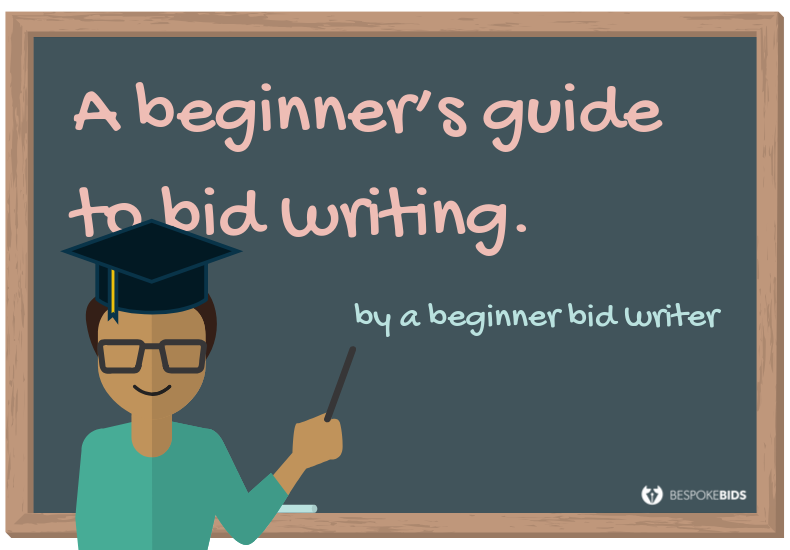
I started work as Junior Bid Manager at Bespoke Bids just over a week ago. Being thrown in at the deep end of tenders, bids, SSQs and ITTs. Here are five lessons any new bid writer learns in their first week.
-
Bid writing is its own individual style of writing
Somewhere between creative and professional writing lies bid writing; in its own unique and distinct form. Good bid writing isn’t long paragraphs of grandiose prose describing your company’s philosophy, nor it is just a dry list of bullet points showing facts, figures and details about a company.
You need to learn to walk a fine line between these two without leaning too far to one side, one that shows your company’s passion and interest for the contract and its experience and ability to carry out the work required. This can be communicated to the client through how you write as well as what you write. There’s no perfect format for writing a successful bid as each professional bid writer has their own personal style developed over time. Like any skill, good bid writing takes time and practise to master properly. So, until you’ve put in the work, it’s best left to the professionals.
-
Bid writing isn’t just marketing and it definitely isn’t sales
You want to win the contract, so it makes sense you have to sell your company. Time to call the sales and marketing department, right? Wrong. A good bid shouldn’t just blow your own trumpet, or include lots of information that makes you look good but has nothing to do with the contract. Bidding is about selling yourself, but you have to sell yourself on how well you can do the work.
Put plainly you must convince the buyer that you are the best company to provide the work that they need. Include case studies, relevant facts and figures and testimonials from pleased clients. Be direct and always steer clear of irrelevant or unrelated information. In short, sell yourself without writing a sales pitch.
-
Bidding can be a force for good
Since the Public Services (Social Value) act became law in 2012 public sector contracts have to consider the potential social value of any given contract, meaning that winning a tender isn’t just about who can do the best job for the cheapest price. ‘Social Value’ includes three distinct areas:
- Economic – how can this contract allow you to stimulate the local economy? Can you employ local workers or buy goods from local suppliers? Will you pay the region-specific living wage.
- Environmental – what is the environmental impact of your organisation, and what can you do to reduce it? How sustainable is the company, and how can it benefit the local environment through this contract?
- Social – how can you be a force for good in the local community? Will you support local charities or take on apprentices etc.
The Social Value Act was strengthened recently, requiring public sector organisations to evaluate the amount of Social Value a company can implement if it is successful in its bid. This means that social value plays an increasingly important role in the bid evaluation process, which can only be a good thing.
-
The devil’s in the detail
Detail is a crucial part of writing a good bid and this begins with research. Read all the documents and requirements provided by the buyer to make sure you know what is required and can fully answer the question. In order to demonstrate to the supplier you can undertake the work needed, you first have to understand exactly what it is that’s required. While the supplier is interested in your previous experience and successful case studies, you always need to include the specifics of how you will carry out their contract. Contractors will be more likely to consider you if you demonstrate how you will achieve what you promise.
Provide logistics and a timetable for each stage of the contract. How will you ensure the quality of the work being carried out? Who will liaise with the clients and customers? How will you measure your own performance to ensure it meets the client’s requirements? How do you plan on improving? If you’re going to support a local charity, which one? Show innovation, recognise your weaknesses and tell the buyer exactly what extra value you can offer. Showing outcomes is important in bid writing, but don’t forget to include the process as well. The contractor has asked a question, so make sure it always answered and backed up with detail.
-
Each and every bid is different
One of the first things I learnt was the huge diversity between different types of bid. Authorities across all industries will be interested in similar aspects of your business e.g. quality management, performance improvement, health and safety etc. However, buyer interests and requirements do vary across industries, meaning a catering bid won’t look exactly the same as a construction bid and a facilities bid won’t look the same as a funding bid. Even within the same sector, no two bids are the same in the same way that no two companies are. Different organisation’s will value and require different things in their contractors, which should be reflected in every bid you write.
Tailor and write each bid specifically for the contract. Think about what exactly the contract is asking or requires so you can answer the question fully and demonstrate that you can fully carry out the all work needed. There’s no one size fits all approach to writing a bid nor is there a standard answer format that should be applied every time you respond to a tender, so definitely don’t just copy and paste from your last one. No two companies are the same, so no two bids should be either.
Basically, bids should be bespoke.
Did you enjoy this post?
Check out one of our latest blogs on being ready for tendering.
Follow Bespoke Bids on Linkedin to keep up with our day-to-day operations. We post live tenders, tips and tricks and more.


